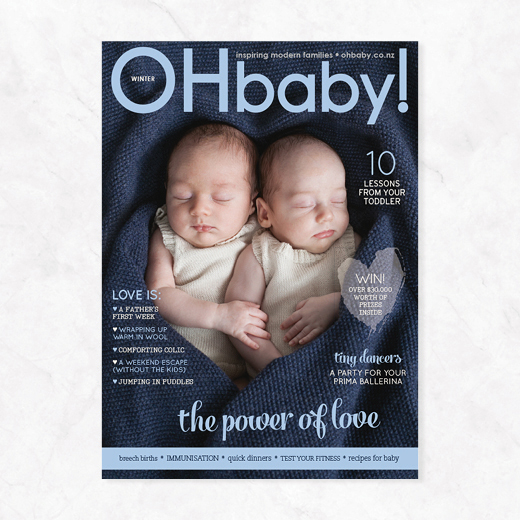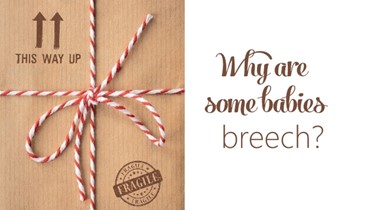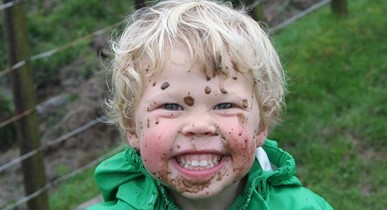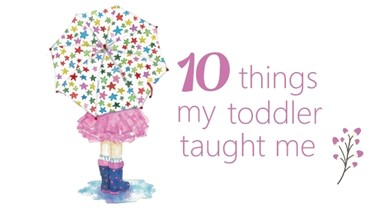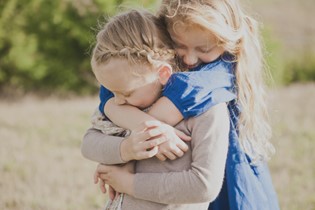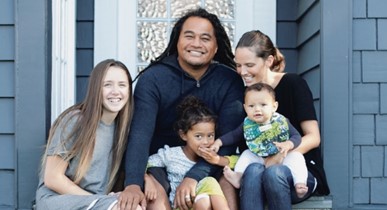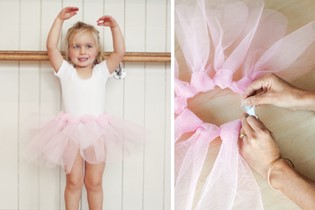The life changing effects of loving your baby

If relationships are our foundation, love is the cement. Miriam McCaleb looks at the life-changing effects of loving our babies.
Babies are amazing. Awesome, in the truest sense of the word. Sometimes as a parent, the only feeling greater than love and awe is one of being overwhelmed by responsibility. Such a small, vulnerable being. So many ways to stuff up! Parents can be inundated with well-meaning advice, often contradictory. “Let him get used to his cot” or “pick him up and cuddle him”. “Exclusively breastfeed” or “let Dad share the joy and burden of feeding". Every subject holds the potential for debate. Our inner scripts can be just as tumultuous. Is this bath the right temperature? Should I use product on that stinky umbilical stump, or just sunshine? And (I wonder about this one even now), is there such a thing as too many singlets?
Baby steps
It helps to talk evidence. What's best for babies? How do humans go from tiny, floppy and utterly dependent, to being mappers of genomes and cookers of dinner? We start with the words of a hugely influential developmental psychologist, the late, great Urie Bronfenbrenner, who said “Development, it turns out, occurs through this process of progressively more complex exchange between a child and somebody else – especially somebody who's crazy about that child”.
We develop as a result of what Dr Bronfenbrenner calls “exchange”, which we will define as the interactive, observable bit of a relationship. The conversations, the touches, the glances. Tone of voice, and –for want of a better descriptor –tone of touch.
Truly: relationships grow humans. Relationships grow our brains and early relationships are the most influential of all. This is a lot like the Maori concept of whakawhanaungatanga: relationships are the foundation of people, families are the foundation of societies. Relationships build our culture. And yeah, they build our brains.
Connect the dots
When we are born, we have about 200 billion brain cells, but few of them are connected. It is the connections between cells (aka synapses) that build knowledge, grow skills, and create intelligence. In the earliest years, these synapses form quickly and easily. These synaptic connections between neurons in the brain strengthen in a use-dependent kind of way. That is, the more times we have a particular experience, the more our brain wires itself to prepare for more of that sort of experience. Our brains eventually prune away the synapses that aren't being used. In the words of neuropsychologist Donald Hebb, “neurons that fire together wire together”.
It shouldn't surprise us that the baby who is usually handled with care and spoken to warmly is likely to grow into a child who easily enjoys friendships. She's a baby who has learned that relationships feel good, and she's grown up with good skills to participate in relationships.
Conversely, we can imagine that the baby whose normal care involves being touched roughly (or rarely) and frequently snarled at (or ignored) might struggle in later relationships. What might surprise us is how those early interactions have altered the fundamental architecture of Baby's brain. Because, to borrow the words of Dr Lou Cozolino, a writer, professor and psychologist, “the brain is where love becomes flesh”.
Long-term investments
It is not an exaggeration to say that the benefits of a secure relationship extend much further than a child's own relationship skills, and will last for a lifetime. The first baby described above is also more likely to grow up to succeed at school, resist addictive behaviours, and enjoy better physical health.
The study of relationship is also known as attachment theory, and in New Zealand we have an organisation whose focus is to share knowledge from this field. The Centre for Attachment (CFA) was formed in 2006 and continues to provide training and information to families and professionals alike. They write “A baby who is blessed with sensitivity, attunement, and responsiveness to their psychological needs is a baby who emerges as a healthy and happy adult”.
For some, this love thing feels easy. For many, the "crazy about that child" part is effortless. Lots of lucky children have access to multiple adults who are crazy about them. This is a great place to start but even loving our children with a passion that startles us is not a money-back guarantee of relationship success. Our relationships with our babies can often trigger our own hurts. Sometimes, wounds we thought long healed can suddenly feel quite itchy. If this is you, you are not alone. Anyone mindfully parenting can't help but notice the lessons that parenting offers. Taking time to tell your own story to a qualified person can be healing for you and your baby. A therapist with a knowledge of attachment will understand the link between the mothering you received and the parenting you provide. No blame, no victims. Just learning and healing. And a whole lotta love.
More than a feeling
Love, sweet love. It's a wonderful, beautiful, powerful force, but again, on its own it doesn’t predict healthy relationships. When we’re talking about family, often it is the behaviours –the action spurred by love – where the magic really happens.
Consider the story of miracle baby Jamie Ogg, whose mama’s warm body, soft words and loving touch defied the declaration of his doctor that he had died in the delivery room. He is alive because his mother acted on her feelings of love for her baby. She scooped his little body against hers and held him against her warm, bare skin. She didn’t love him from across the room. She expressed her love for him with caresses and murmurs, not by posting about it online.
Feeling love is delicious but expressing love as appropriate action is what really feeds us, and others - especially those babies. Feeling love isn’t always the same as 'doing' love. Love is indeed a glorious feeling. It's powerful, transformative, and beautiful. It writes poems and takes selfies. But remember: love is not always dressed up for an awards ceremony, shiny and glowing. Love is more often in an ill-fitting bra and faded yoga pants.
It’s 'doing' love that really counts; it hauls us out of bed for yet another night-time feeding. It’s love that means we can’t really concentrate on what anyone’s saying if our baby is grizzling. Love is what it looks like when you’re cleaning up your child’s runny poo at 3am. Love spurs us to read the same tatty board book again and a-flippin-gain.
Writer and psychotherapist Naomi Stadlen's wonderful book, How Mothers Love, gives voice to these kind of tiny and seemingly invisible acts of love that fill the days of mothers providing care. The concrete examples of the nuanced busyness of parenthood are a relief to anyone who has ended a day of baby care feeling like she has 'done nothing'. Poppycock. “What did I do today? Nurture a baby. Grow a brain. Build a relationship.”
Stadlen writes with a lightness of touch and solid wisdom that has me yearning for a parallel universe, one where a parent’s consistently attentive nappy changes are celebrated like Lydia Ko's mighty drive on the par 3. A world where Beyoncé's repeated wiping-down of the high chair is as admired as her song writing. Who wants to join me in creating some version of that world for ourselves, and for others?
In this world, caring for children is given the same status as being a CEO. I say to you, mamas, as you wipe runny noses, scrape crusty yoghurt, and bandage grazed elbows; you are Queens. Priestesses. Architects of Brains and Weavers of Futures. Anyone who says otherwise deserves your pity because they just don’t know any better.
DOING LOVE
● Start by observing your baby. Really watch her –her face, her movements. Truly listen: what noises does she make at different times? Mothers who sit and gaze at their beautiful babies are not wasting time. Paying full, conscious attention is a deceptively simple and intensely powerful technique for increasing understanding. And without it, we can’t know what Baby is telling us about what she needs or wants.
● Let this observation be a touchstone in your relationship. Think of it as 'home base'. It is from this point that we strive for genuine responsiveness (Baby leads, you follow. Baby requests, you provide). We are reading Baby’s cues. This is what it means to become attuned.
● Remember: humans evolved this amazing brain without screens. Hide your tablet, shut down your Smartphone, turn off the telly. As often as you truly can!
● Use the power of your lovely, familiar voice (which Baby recognises from when she was on the inside of you) to provide a soundtrack to daily experiences. Describe what you are doing. Describe what you think baby is doing or feeling. If you don’t know what to do next, say that too! “Oh, Baby. You are crying a lot! I have tried to feed you but you don’t seem to want milk. Let’s try walking around outside. I’ll hold you close and we’ll go under the trees. Come on ...” Oh, and use your voice to sing. All the time. Sing.
● Touch your baby. A lot. This is important for all brand new babies, and super-duper important for pre-term babies. The benefits of skin-to-skin contact (aka kangaroo care) for babies born prematurely are well documented and include improvements in breathing, heart rate, weight gain, sleep, and earlier discharge from hospital. Benefits for mama include greater reported feelings of closeness with their babies, and increased milk supply. In the early days, whip your shirt off. Have hubby do it too. Warm skin is a medicine.
● Hold your baby. A lot. Slings and other devices for babywearing are really useful here. You might need to try a couple of types of wraps or slings before you find one that works for the unique combo of your shape and your baby’s. Ideally, we’d all have a community library of them so we could use different types at different ages. And Dad can too!
● Yes! Dads. Fathers have a crucial role to play in the cognitive, social, and emotional development of our kids. An involved father is one who is engaged, available, and responsible. The children of involved fathers are more empathetic, have better friendships, and are better able to manage frustration and disappointment. When they become adults, those kids are less likely to run into problems with the law, drugs, and teenage pregnancy.
● Think about how care routines can be used to enhance your relationship. No joke: feeding, dressing, nappy changing, bathing –these things are not burdensome but are gifts. Use these opportunities for connection in our busy lives. Read Baby’s cues and involve her in her care (“can you lift your legs up so I can get the wet nappy out?”). You might be amazed what she can do.
Miriam McCaleb parents, gardens, and writes at home in rural North Canterbury.

AS FEATURED IN ISSUE 30 OF OHbaby! MAGAZINE. CHECK OUT OTHER ARTICLES IN THIS ISSUE BELOW
